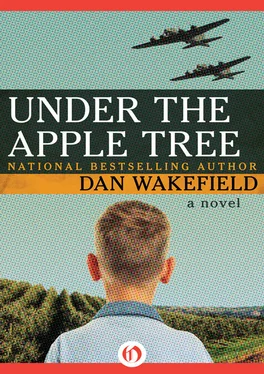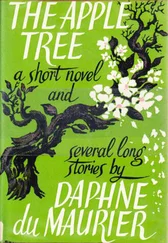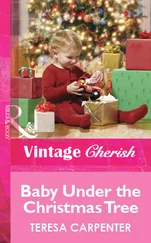Ben Vickman leaned across Caroline Spingarn and whispered:
Roses are red, violets are blue,
Roy Garber flunked English and chemistry,
Boo hoo hoo.
There were hisses and “Shhhhs” all around, and Artie pretended he didn’t even hear.
Warren Tutlow went up to the microphone that Mr. Goodleaf lowered to suit his size, and cleared his throat. He recited without even looking on the paper he had written it down on:
From the Halls of Birney High School
To the Shores of Tripoli
He will fight our Bearcat battles now
On land and on the sea.
He will lick the Japs and Germans
And come home to Victory,
He’ll get out of close shaves better than any barber,
We know we can all depend on Roy Garber.
There were cheers and whistles and stomping on the floor, and a little girl in pigtails from the first grade, Nancy Ann Ibbetsen, ran from the wings and handed Roy a bunch of paper daisies, curtsied, then ran off to laughter and applause.
Now, Roy moved.
He took the white Marine dress cap from his lap and placed it, along with the paper daisies, on his chair, as he stood and strode to the microphone, which Mr. Goodleaf adjusted upward.
Assuming the position of Attention, heels clicked together, Roy looked straight ahead, his jaw firm, his eyes focused on some faraway battlefield.
“Thank you,” Roy said.
Artie felt goose bumps. It was just the thing to say.
“I want to thank all of you, teachers and students alike, for giving me the inspiration and morale to fight for all of you. The world is in flames, and it is the job of me and the other men of the Service to see that those flames never touch these shores. I have a family here. My own little brother is in the auditorium.”
Artie bowed his head as he felt the eyes of others looking on him in awe.
“I have pride in my home and my country, and I will fight to the death to keep them—to keep you—safe for democracy. Whatever happens, you can be sure that I will uphold and honor the motto of the uniform I now wear—Semper Fidelis. Always Faithful.”
Roy did an about-face and went back to his seat, as everyone rose and cheered and Mr. Goodleaf struck up the Band to play “God Bless America” and the sound shook the hall.
When the song was over, Roy marched down from the stage, through the crowd, and went right to where Shirley Colby was sitting. He held out his arm and she rose, putting her own arm in his, and as they walked off together the crowd parted, as it would have for Cinderella and the Prince. Although he couldn’t see it with his eyes, Artie had the feeling that Roy and Shirley were surrounded by a kind of halo of light, the invisible magnetism of love.
“Isn’t it heavenly?”
“Huh?” Artie said, embarrassed at being caught in the middle of his Own daydream.
Caroline Spingarn was leaning close to him, the sweet smell of the Mild Beauty Soap oozing from her every pore.
It turned out that the secret present Roy had brought back to Shirley Colby after Boot Camp was nothing at all like the tasseled pillow he had got his mother, or any kind of souvenir of Quantico, Virginia, or Marine Corps stuff. He had brought her a shoulder patch of his outfit, just like the one he gave to Artie, but that wasn’t the main thing by a long shot.
The main thing was an actual engagement ring.
It didn’t have a diamond in it—Roy couldn’t afford one of those—but it wasn’t just a high school ring or Marine Corps ring; it was a regular kind that you bought in a jewelry store and it had a little gold heart on it.
Mr. and Mrs. Garber were kind of flabbergasted, but they pretty much said if that’s what the kids wanted to do, it was their lives. Besides, it was Wartime, and everything happened faster now. Artie’s Dad lit up a cigar for the occasion, and staring philosophically through a doughnut-sized smoke ring said, “One generation cometh, and another generation passeth away.” Mrs. Garber broke out the fermented cider from its hiding place in the basement and poured everyone a glass of it, including Artie (his first!), and recited to Roy, “May you live in a house by the side of the road and be a friend to man.”
Shirley’s parents didn’t take the news so philosophically.
In fact, they raised the roof. They demanded to “have the whole thing out” with Roy and his family, and for that grim purpose invited the Garbers for supper. Except they called it “dinner.”
Mr. and Mrs. Colby had been the big dogs of the whole town until the Crash came and wiped out the First National Bank of Birney. Mr. Colby had been the president of the bank and he lost his position as well as his personal fortune that he got from his rich parents who owned a whole lot of land that the railroad bought and they gave up farming for Travel Abroad.
Kenneman Colby went to the University of Urbana and belonged to what Artie’s Dad called “Eta Piece-a Pi,” but that was just the name he gave to all the snooty fraternities. Mr. Colby belonged to one of the snootiest, and married this glamorous gal from the Quad Cities area, Marcelline Huckaby, who was also in one of the snooty sororities and came back to Birney to help her new husband be head of the bank and lord it all over the ordinary people. After the Crash when they had to sell the big family house on the hill and move to Pine Street, they scrunched all their fancy furniture and stuff into it. Mr. Colby took a small office on Main Street and had a sign painted in gold on the window that said, “Kenneman Colby, Investment Counselor.” Actually, what he did was, he helped some farmers and businessmen balance their books and make out their tax forms.
For the big night of dinner at the Colbys, the Garbers got all decked out in their finest. Roy put on his Marine dress uniform with the red stripe down the blue pants, Mom donned the black dress with the dime store pearls and the run-down red high heels, Dad put on the blue serge suit with the white shirt and the tie with a hand-painted waterfall that he wore to funerals and Moose Lodge banquets, and Artie wore the brown wool Sunday School suit that made him itch like a madman, complete with the starched shirt and red knit tie that his Mom said was dashing, but gave him the feeling he was being slowly strangled. Artie had wanted to wear his Cub Scout uniform, but his folks said that wouldn’t do for the Colbys.
Even Artie’s torturous outfit that made him feel like the Mummy didn’t impress the Colbys. Shirley’s folks looked surprised and ticked off to see him there. “You brought the boy?” Mr. Colby asked; in a tone that would chill your gizzard.
“You said ‘the family.’ Artie’s part of the family,” Dad answered back.
“He’s only a child,” Mrs. Colby said, looking down her nose at Artie.
“I’m eleven years old on April eighteenth,” Artie told her.
Shirley, who looked very pale in her black dress and hardly any makeup, came to Artie’s side and took his hand.
“Artie’s my very dear friend,” she said, which made a lump in Artie’s throat that almost choked him in the collar and tie.
“Very well,” Mrs. Colby said, “won’t you all have a seat, please?”
She reminded Artie of a mean governess in one of those English movies where everyone sat around making nasty cracks at each other. Her hair was pulled back in a bun and the collar of her plain blue dress was sealed with an old-timey brooch, like it was locking her clothes on for extra safety. Mr. Colby as per usual had a suit with a vest and a gold watch chain with his old fraternity emblem dangling from it. Artie bet the Colbys never washed the dishes together and nuzzled each other like his own parents did.
Читать дальше












